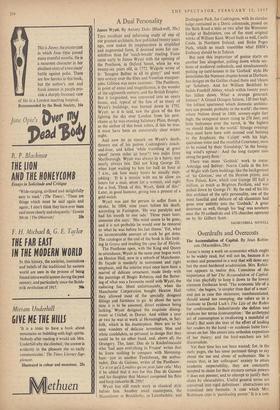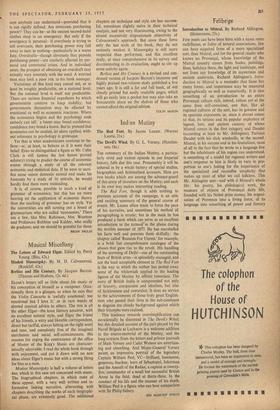Overdrafts and Overcoats
THERE'S many a work on economics which ought to be widely read, but will not be, because it is written and presented in a way that will deter any but the most hardened academician. Mrs. Robin- son appears to realise this. Conscious of the importance of her The Accumulation of Capital, she tries playfully to keep it down to the lowest common freshman level. 'The economic life of a robin,' she begins, is simpler than that of a man'; and just in case this statement, unsubstantiated, should sound too sweeping, she refers us in a footnote to David Lack's The Life of the Robin for confirmation. Industriously she defines and explains her terms (consumption : 'the archetypal act of consumption is swallowing a mouthful of food'). But soon she tires of the effort of leading her readers by the hand—or academic habit fore- closes on her. She enters into orthodox exposition of her theory; and the bird-watchers are left disconsolate.
Yet their time has not been wasted; for, in the early pages, she has some pertinent things to say about the use and abuse of ecdnomics. She is aware that, in her colleagues' anxiety to attain academic respectability, they are constantly tempted to claim for their mystery, certain powers it does not possess; and to attempt to justify their claim by abracadabra. Useful general terms are converted into rigid definitions : abstractions are translated into formulae. A case which Mrs. 'Robinson cites is 'purchasing power.' It is a con-
cept anybody can understand—provided that it is not rigidly defined. Are overcoats purchasing power? They can be—at the nearest second-hand clothes shop in an emergency. But only if the emergency is personal : if everybody is trying to sell overcoats, their purchasing power may fall away to next to nothing—particularly in a warm July. Overdrafts—though obviously they provide purchasing power—are similarly affected by per- sonal and communal crises. And in individual cases, the prospect of obtaining an overdraft may actually vary inversely with the need. A worried man may look a poor risk to his bank manager.
Variations of this kind may cancel out, or at least be roughly predictable, on a national level. But the national level is itself not predictable. There are various financial expedients by which governments contrive to keep stability; but governments themselves may be affected by emotional as well as economic reactions. Where the economics begins and the psychology ends nobody can tell : a boom may breed confidence; confidence may breed a boom. But to pretend that economics can be studied, let alone applied, with- out reference to psychology is grotesque.
Yet that is what academicians continue to be- lieve—or, at least, to behave as if it were their belief. Even so distinguished a figure as Mr. Colin Clark is still (unless the last lesson proved salutary) trying to predict the course of economic events through a study of all the relevant economic and statistical data. If he were to sacri- fice some minor domestic animal and make his forecasts by a study of its entrails, he would hardly find them more misleading.
It is, of course, possible to teach a kind of grammar of economics; but this has no more bearing on the application of economic theory than the teaching of grammar has on style. Yet the universities are still turning out a breed of grammarians who are called 'economists.' There are a few, like Mrs. Robinson, Mrs. Wootton and Professors Robbins and Kaldor, who really do graduate; and we should be grateful for them.
BRIAN INGLIS



































 Previous page
Previous page